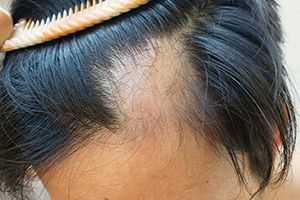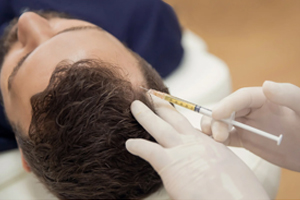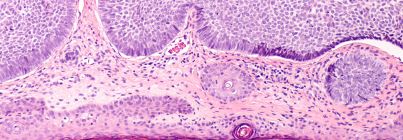Hair Disorders and Alopecia
Understanding and Treating Hair Loss (Alopecia)
 Hair loss can be distressing for anyone, regardless of gender. Along with thinning hair, you may experience an itchy, sensitive or uncomfortable scalp.
Hair loss can be distressing for anyone, regardless of gender. Along with thinning hair, you may experience an itchy, sensitive or uncomfortable scalp.
At the UC Davis Health Specialty Clinic for Hair Disorders, we offer advanced, highly effective treatments for all types of alopecia and unexplained hair loss. From corticosteroid injections to topical immunotherapy, our comprehensive range of therapies is carefully tailored to meet your individual needs.
What is Alopecia?
Alopecia is a skin disorder that causes hair to fall out from the scalp, face or body. There are different types of alopecia, including:
- Alopecia areata causes isolated, circular bald patches on the scalp.
- Central centrifugal cicatricial alopecia (CCCA) causes hair to thin outward from the crown of the scalp.
- Lichen planopilaris causes thinning hair or bald patches along with itchy, scaly skin. It may lead to permanent hair loss.
- Androgenetic alopecia causes the hairline to cede as well as hair loss on the top and front of the head.
- Telogen effluvium causes temporary hair loss typically due to stress or a traumatic event.
What Causes Alopecia?
Alopecia affects people of all ages, genders, races and ethnicities. It can start in childhood. Several factors may contribute to hair loss, including:
- Autoimmune disease — For unknown reasons, the immune system mistakenly attacks healthy hair follicles, stopping hair growth.
- Genetics — Genes play a small role in alopecia. Most children with alopecia do not have a parent with the disorder. And most parents with alopecia do not pass on the disorder to their children. UC Davis Health counselors in genomic medicine can help you understand potential genetic links.
- Hair products — Women who use hot oils and chemical relaxers may be more prone to CCCA. These hair products can inflame the scalp and cause hair follicle scarring that stops hair growth.
- Hairstyles — Repeatedly pulling on hair to create certain hairstyles can damage hair follicles. This condition, called traction alopecia, is more common in Black women.
- Hormones — The androgen hormone regulates hair growth in both men and women. People with high androgen levels may experience rapid hair loss. Others have a faulty androgen receptor gene that causes androgenetic alopecia. Men with this faulty gene experience male-pattern baldness while women have thinning hair.
- Nutritional deficiencies — A diet lacking in certain vitamins and nutrients may affect hair growth.
Choosing UC Davis Health for Alopecia and Hair Disorder Care
Our Specialty Clinic for Hair Loss Disorders is a trusted resource in Sacramento, offering comprehensive expertise and compassionate care. Here’s what sets us apart:
Leading Expertise
Our clinic director, Oma Agbai, M.D.,, has received the highest level of training in treating hair loss and ethnic skin conditions. With her advanced expertise, she provides thorough evaluations and develops personalized treatment plans tailored to each patient. We are proud to be the only hair loss disorders clinic in Sacramento offering this level of specialized care. In addition, Dr. Agbai leads our Multicultural Dermatology Clinic, extending her commitment to excellence in serving patients of diverse backgrounds.
Wide Range of Treatments
Once we determine the cause of your hair loss, we create a personalized treatment plan designed for the best possible results. Dr. Agbai is also actively involved in dermatology research and clinical trials, working to discover new and more effective therapies for hair loss. As a patient, you may even have the opportunity to access innovative treatments still in development.
Specialized Team
Our team of board-certified dermatologists delivers expert care for a wide range of skin and hair conditions — from the most common concerns to the most complex. Explore our dermatology specialties to see how we can help.
Advanced Diagnostics
Identifying the underlying cause and type of alopecia is essential for effective treatment. That’s why we begin with a comprehensive evaluation, which may include:
- Examining your personal medical history
- Conducting a dietary assessment
- Undergoing blood tests
- Having a tissue sample (biopsy) sent to our Dermatopathology Service for testing
Our Hair Loss Treatments
 Treatment options vary depending on the type and cause of hair loss. In some cases, therapies can stimulate regrowth. When regrowth isn’t possible, we focus on slowing or preventing further hair loss. Your dermatologist may recommend one or more of the following treatments:
Treatment options vary depending on the type and cause of hair loss. In some cases, therapies can stimulate regrowth. When regrowth isn’t possible, we focus on slowing or preventing further hair loss. Your dermatologist may recommend one or more of the following treatments:
Rogaine® (minoxidil)
Twice-daily treatment with topical minoxidil (Rogaine®) can slow hair loss and stimulate new hair growth. This prescription cream may be combined with a topical corticosteroid cream. Hair may gradually fall out when treatment stops. Minoxidil is not effective on people who have complete hair loss.
Topical Corticosteroids
Topical (applied directly to skin) corticosteroid products decrease hair follicle inflammation, which promotes new hair growth. Your physician may combine this topical treatment with other therapies.
Topical Anthralin
This anti-inflammatory product stimulates new hair growth. You apply the solution to the affected areas once daily, then rinse it off within one hour.
Topical Immunotherapy
Topical immunotherapy creams alter the immune system by causing an allergic rash (also known as allergic contact dermatitis). The rash looks like poison ivy and may be red and itchy. It lasts about 36 hours.
Approximately 40% of people with alopecia areata experience hair regrowth within six months, but you must continue treatment to maintain your results.
Corticosteroid Injections
This treatment for alopecia areata helps stimulate hair follicles to promote new hair growth, which may become noticeable within about two months. It’s important to note that corticosteroid injections do not prevent future hair loss, and newly grown hair may shed once treatment ends.
To apply corticosteroid injections, your physician:
- Injects a steroid solution into and around bald patches
- Repeats the process every six to eight weeks
Propecia® (finasteride)
This prescription oral medication lowers the dihydrotestosterone (DHT) hormone in men that shrinks hair follicles. You take the medication daily to stop hair loss and stimulate hair regrowth. Results can take up to six months to become noticeable. Hair loss resumes when treatment stops.
Oral Immunosuppressants
If an autoimmune disease is the cause of alopecia, immunosuppressants can lessen the abnormal immune response. However, the new hair growth may fall out when treatment stops.
Immunosuppressants, such as oral corticosteroids, can cause side effects. Your physician will closely monitor your health. Potential side effects include:
- Acne
- High blood pressure
- Vision problems
- Weight gain
Vitamins and Supplements
Certain nutritional deficiencies can affect hair growth. Your physician will review your nutrient intake and recommend supplements to support hair growth. These supplements may include:
- Iron
- Vitamin D
- Zinc
Contact Us
For more information or to schedule an appointment, please call 916-734-6111 or 800-770-9282.


